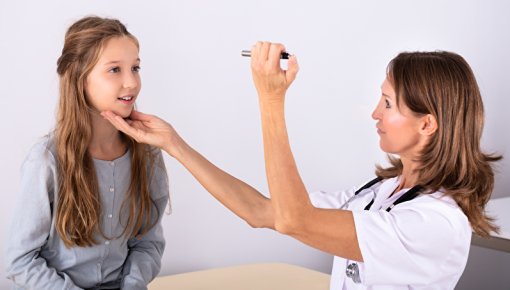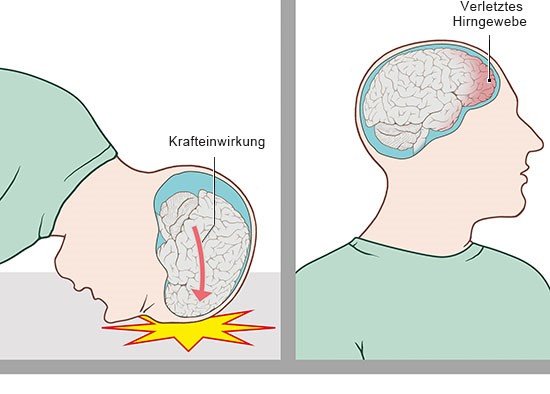Arbabi M, Sheldon R, Bahadoran P et al. Treatment outcomes in mild traumatic brain injury: a systematic review of randomized controlled trials. Brain Inj 2020; 34(9): 1139-1149.
Centers for Disease Control and Prevention (CDC). Mild TBI and Concussion. 2021.
Cover R, Roiger T, Zwart MB. The Lived Experiences of Retired Collegiate Athletes With a History of 1 or More Concussions. J Athl Train 2018; 53(7): 646-656.
Cunningham J, Broglio SP, O'Grady M et al. History of Sport-Related Concussion and Long-Term Clinical Cognitive Health Outcomes in Retired Athletes: A Systematic Review. J Athl Train 2020; 55(2): 132-158.
Deutsche Gesellschaft für Neurochirurgie (DGNC). Schädel-Hirn-Trauma im Erwachsenenalter (S2e-Leitlinie, in Überarbeitung). AWMF-Registernr.: 008-001. 2015.
Enniss TM, Basiouny K, Brewer B et al. Primary prevention of contact sports-related concussions in amateur athletes: a systematic review from the Eastern Association for the Surgery of Trauma. Trauma Surg Acute Care Open 2018; 3(1): e000153.
Gallo V, Motley K, Kemp SP et al. Concussion and long-term cognitive impairment among professional or elite sport-persons: a systematic review. J Neurol Neurosurg Psychiatry 2020; 91(5): 455-468.
Gänsslen A, Schmehl I. Leichtes Schädel-Hirn-Trauma im Sport. Handlungsempfehlungen. Bundesinstitut für Sportwissenschaft (BISp). 2015.
Gesellschaft für Neonatologie und pädiatrische Intensivmedizin e.V. (GNPI). Das Schädel-Hirn-Trauma im Kindes- und Jugendalter (S2k-Leitlinie). AWMF-Registernr.: 024-018. 2022.
Hannelore Kohl Stiftung für Unfallverletzte mit Schäden des Zentralen Nervensystems (ZNS). Prävention - Kopfverletzungen vermeiden, Unfallzahlen senken. 2021.
Kulnik ST, Halter M, Hilton A et al. Confidence and willingness among laypersons in the UK to act in a head injury situation: a qualitative focus group study. BMJ Open 2019; 9(11): e033531.
Langevin P, Frémont P, Fait P et al. Aerobic Exercise for Sport-related Concussion: A Systematic Review and Meta-analysis. Med Sci Sports Exerc 2020; 52(12): 2491-2499.
Lumba-Brown A, Yeates KO, Sarmiento K et al. Centers for Disease Control and Prevention Guideline on the Diagnosis and Management of Mild Traumatic Brain Injury Among Children. JAMA Pediatr 2018; 172(11): e182853.
McCrory P, Meeuwisse W, Dvorak J et al. Consensus statement on concussion in sport - the 5th international conference on concussion in sport held in Berlin, October 2016. Br J Sports Med 2018; 51(11): 838-847.
Möller MC, Lexell J, Wilbe Ramsay K. Effectiveness of specialized rehabilitation after mild traumatic brain injury: A systematic review and meta-analysis. J Rehabil Med 2021; 53(2): jrm00149.
National Institute for Health and Care Excellence (NICE). Head injury: assessment and early management (NICE Clinical Guidelines; No. 176). 2019.
Ontario Neurotrauma Foundation (ONF). Guideline for Concussion / Mild Traumatic Brain Injury and Prolonged Symptoms. Health Care Professionel Version, 3rd Ed. Adults 18+ years of age. 2018.
Pschyrembel Online. 2021.
Sarmiento K, Waltzman D, Lumba-Brown A et al. CDC Guideline on Mild Traumatic Brain Injury in Children: Important Practice Takeaways for Sports Medicine Providers. Clin J Sport Med 2020; 30(6): 612-615.
Silverberg ND, Duhaime AC, Iaccarino MA. Mild Traumatic Brain Injury in 2019-2020. JAMA 2020; 323(2): 177-178.
Statistisches Bundesamt. Unfälle, Gewalt, Selbstverletzung - Tabellenband - Ergebnisse der amtlichen Statistik zum Verletzungsgeschehen 2019. 2021.
Van Ierssel J, O'Neil J, Sveistrup H et al. A qualitative study of persons with persistent postconcussion symptoms and clinicians with concussion expertise to inform the development of a concussion-specific questionnaire. Disabil Rehabil 2021; 43(23): 3365-3376.
IQWiG-Gesundheitsinformationen sollen helfen, Vor- und Nachteile wichtiger Behandlungsmöglichkeiten und Angebote der Gesundheitsversorgung zu verstehen.
Ob eine der von uns beschriebenen Möglichkeiten im Einzelfall tatsächlich sinnvoll ist, kann im Gespräch mit einer Ärztin oder einem Arzt geklärt werden. Gesundheitsinformation.de kann das Gespräch mit Fachleuten unterstützen, aber nicht ersetzen. Wir bieten keine individuelle Beratung.
Unsere Informationen beruhen auf den Ergebnissen hochwertiger Studien. Sie sind von einem Team aus Medizin, Wissenschaft und Redaktion erstellt und von Expertinnen und Experten außerhalb des IQWiG begutachtet. Wie wir unsere Texte erarbeiten und aktuell halten, beschreiben wir ausführlich in unseren Methoden.


